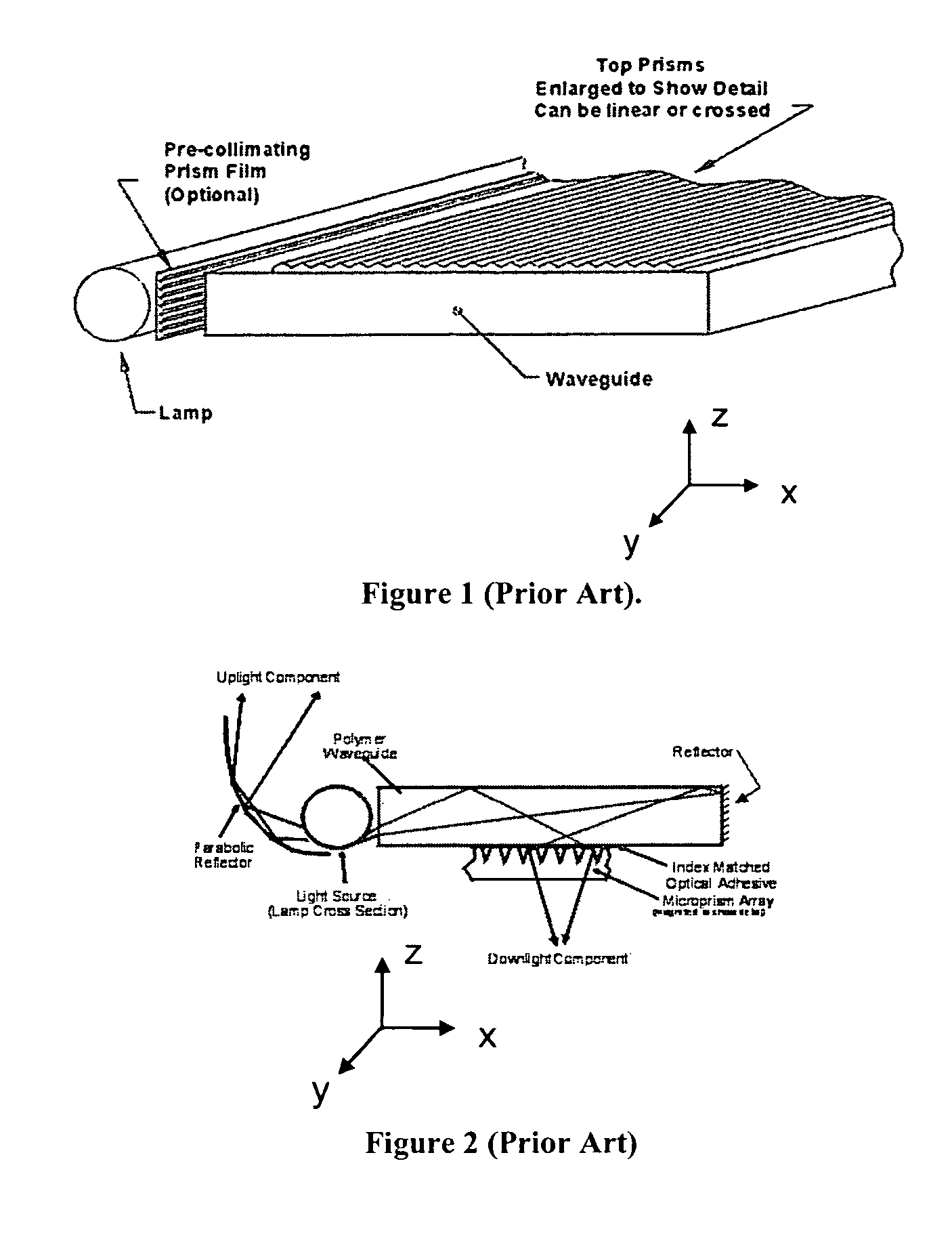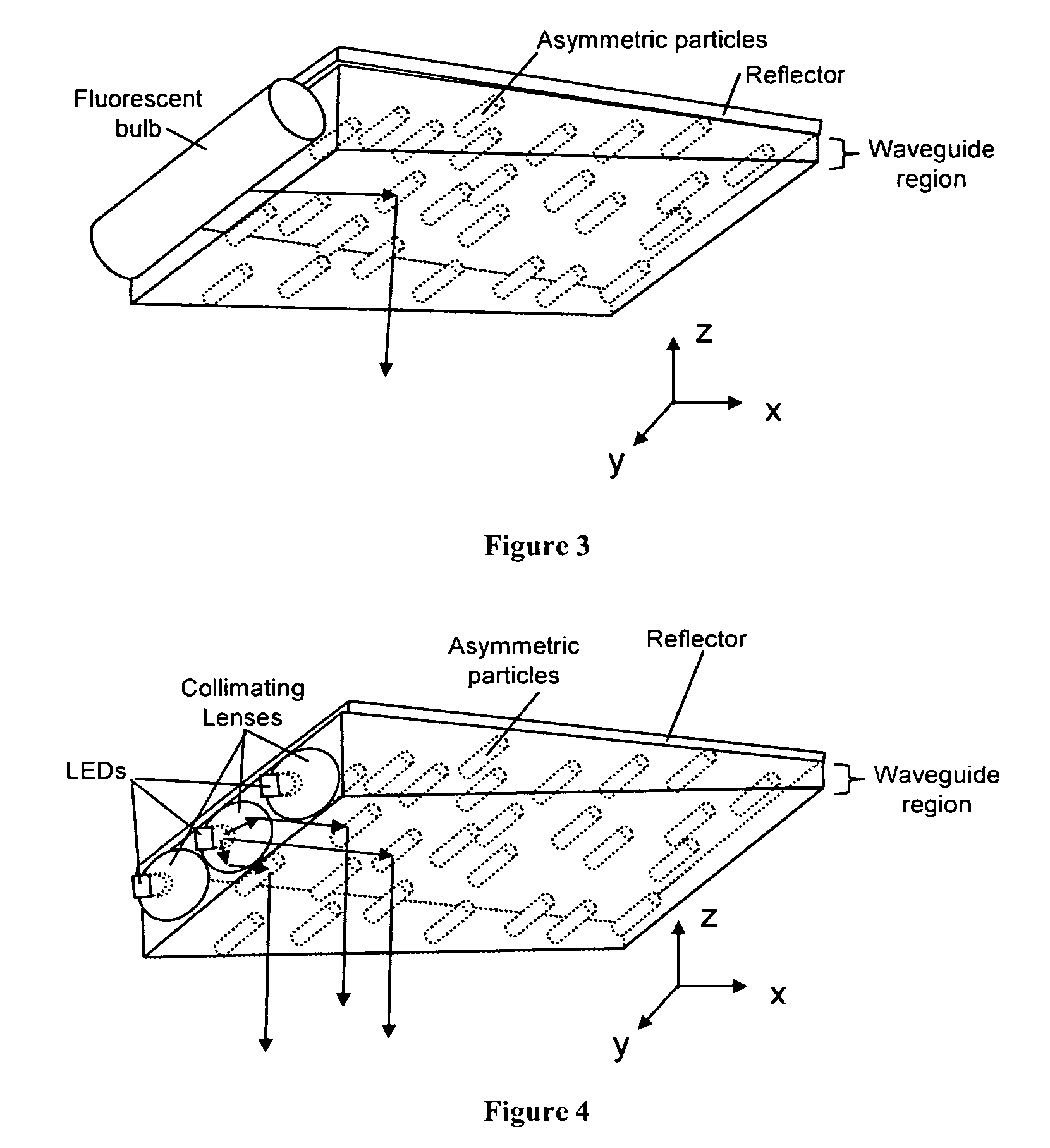Enhanced light fixture
a technology of enhanced light and diffusers, applied in the field of light fixtures, can solve the problems of ineffective inefficient light distribution in light fixtures, and light exiting the fixture using symmetrically scattering diffusers not typically producing uniform light illumination, etc., to achieve efficient control of light spread, enhance light fixtures, and provide spatial luminance uniformity
- Summary
- Abstract
- Description
- Claims
- Application Information
AI Technical Summary
Benefits of technology
Problems solved by technology
Method used
Image
Examples
example 1
[0085]An enhanced light fixture in accordance with the present invention can be produced as described in FIG. 5, that is designed to have increased optical efficiency, increased spatial luminance, be easy to clean, and low cost. This is possible because the volumetric anisotropic scattering film optically coupled to the waveguide more efficiently controls the light scattering. An anisotropic light scattering film is created with scattering particles in a host matrix material by extruding, casting or coating, the mixture containing particles. The particle chosen may be a polystyrene bead of diameter 5 μm dispersed at 10% concentration in a host matrix of acrylic. Other choices of particles and host matrix may provide equivalent performance and details of other methods for creating an anisotropic light scattering film suitable for use in a light fixture are illustrated in U.S. Pat. No. 5,932,342, the text of which is incorporated herein by reference. Asymmetry and alignment of the asy...
example 2
[0086]An enhanced light fixture in accordance with the present invention can be produced as described in FIG. 9, that is designed to have increased optical efficiency, reduced speckle contrast, be easy to clean, and low cost. This is possible because the multiple regions of asymmetrically scattering particles optically coupled to the waveguide more efficiently control the light scattering while reducing speckle contrast. A light diffusing film containing light scattering particles in a host matrix material is created by extruding, casting or coating, the mixture containing particles. The particle chosen may be a polystyrene bead of diameter 5 μm dispersed at 10% concentration in a host matrix of acrylic. Other choices of particles and host matrix can provide equivalent performance. Asymmetry and alignment of the asymmetry can be created by stretching or extrusion processes. A portion of the resulting film containing asymmetric particles is optically coupled to a transparent acrylic ...
example 3
[0087]An enhanced light fixture in accordance with the present invention can be produced as described in FIG. 1, that is designed to have increased optical efficiency, reduced speckle contrast, be easy to clean, and low cost. This is possible because the multiple anisotropic light scattering regions optically coupled to a substrate, creating a waveguide with efficient light scattering, increased spatial luminance uniformity and reducing speckle contrast. A multi-region light diffusing film containing light scattering particles in a host matrix material is created by extruding, casting or coating, the mixture containing particles. A substantially non-scattering material is optically coupled in-between the light scattering regions. The particles chosen may be a polystyrene bead of diameter 5 μm dispersed at 10% concentration in a host matrix of acrylic. Other choices of particles and host matrix can provide equivalent performance. Asymmetry and alignment of the asymmetry can be create...
PUM
 Login to View More
Login to View More Abstract
Description
Claims
Application Information
 Login to View More
Login to View More - R&D
- Intellectual Property
- Life Sciences
- Materials
- Tech Scout
- Unparalleled Data Quality
- Higher Quality Content
- 60% Fewer Hallucinations
Browse by: Latest US Patents, China's latest patents, Technical Efficacy Thesaurus, Application Domain, Technology Topic, Popular Technical Reports.
© 2025 PatSnap. All rights reserved.Legal|Privacy policy|Modern Slavery Act Transparency Statement|Sitemap|About US| Contact US: help@patsnap.com



